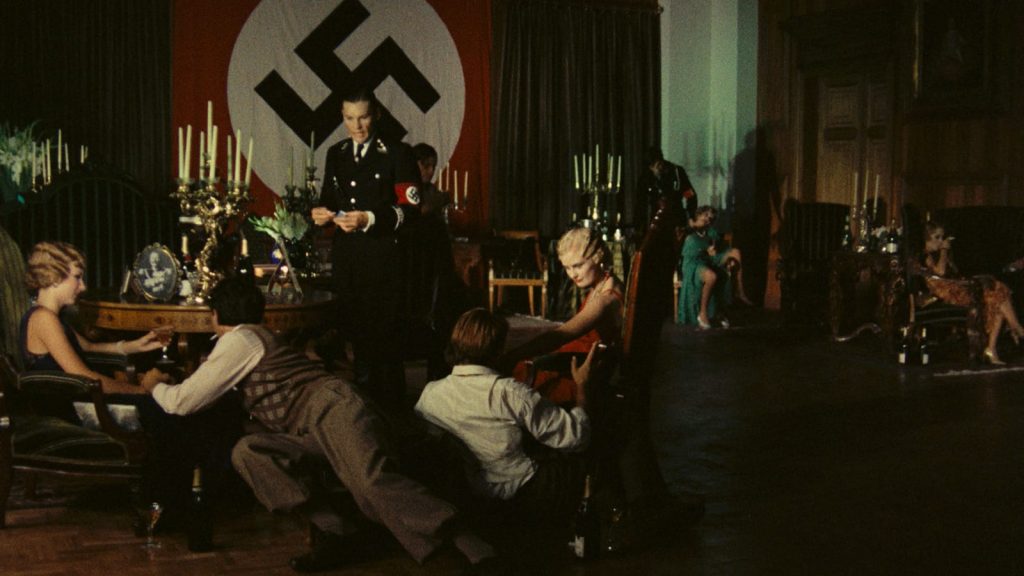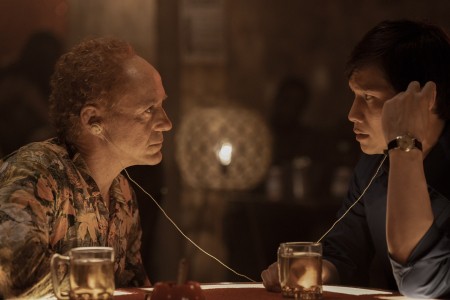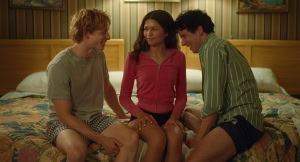There are keywords that pop up again and again when you delve into discussions of Luchino Visconti’s 1969 historical drama The Damned. Outrageous, excessive, demented, depraved – this film is no walk in the park as it uses the power-hungry plight of one German family to mirror the moral decay of the country with the National Socialist takeover. More than any other film from the man who brought us works such as The Leopard and L’Innocente, the creative is taking things to the extreme. As the first entry in his “German Trilogy,” followed by Death in Venice and Ludwig, Visconti eschews typical historical drama with something more in common with an exploitation film. The film thinks nothing of showing sadistic violence, incest, and pedophilia on its path to deconstructing and subverting this time period. It is a singular vision that only the flamboyant personality of Visconti could bring to the screen. While censors have tried to tame this one over the years, the original vision of The Damned that exists today is a challenging text that is hard to turn away from.
The grand familial melodrama is central to shining a light on some of the malicious woes of 1930s Germany. The powerful von Essenbeck family – an echo of the real-life Krupp munitions dynasty no matter what Visconti claims – are industrialists emblematic of the greed and desire that allowed the Nazis to take over the country. Now, patriarch Joachim (Albrecht Schoenhals) is fervently against this pesky Hitler fellow, as is his communist-leaning son, Herbert (Umberto Orsini), but when there is dissension in the ranks trouble soon follows. Power-hungry war widow Sophie (Ingrid Thulin) and her lover Friedrich Bruckmann (Dirk Bogarde), the opportunistic manager of the family’s firm, see an opportunity to capitalize on the growing Nazi uprising by murdering the patriarch and pinning it on Herbert while seizing control of the business. Aschenbach (Helmut Griem), a cousin to the family and an important leader in the Nazi S.S., keeps Bruckman in line by using Sophie’s son Martin (Helmut Berger) who controls the majority of the shares in the company as a threat. While many figures believe they have power at various moments, they are dispatched as desired by the Nazis.
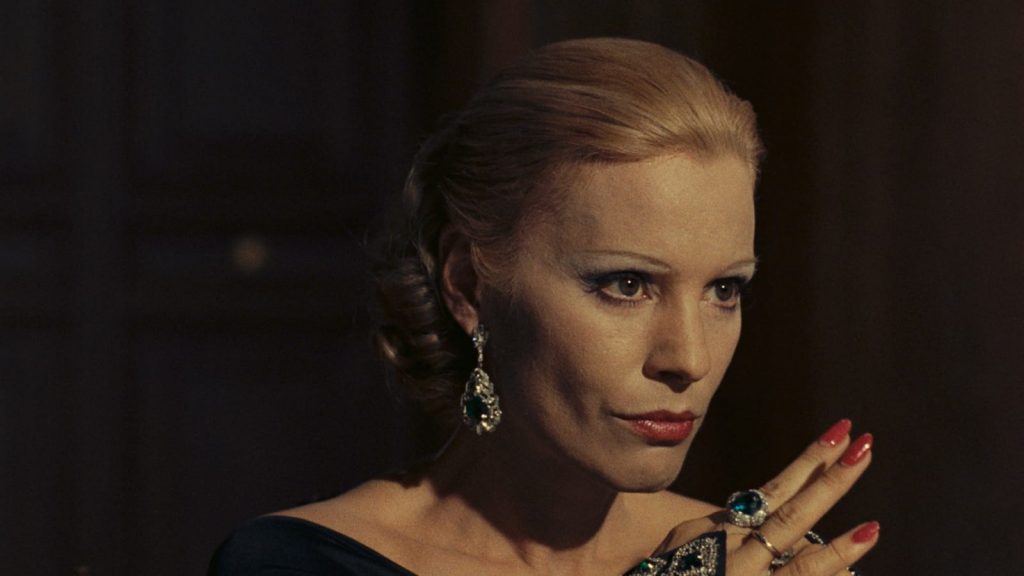
This is only a taste of the convoluted family melodrama on display in this story. Visconti dabbles in real-life historical events in inventive ways that hopefully less historically-inclined individuals will view as fictional as Tarantino’s decision to violently kill Hitler at the end of Inglourious Basterds. Certain inclusions are more subtle, such as the murder of Joachim coinciding with the February 1933 Reichstag fire that allowed Hitler to consolidate his power base. Others are more overtly products of a rebellious Visconti; the infamous June 1934 Night of the Long Knives is given quite a twist in its execution. In a segment that feels like a different films (it evens switches to German dialogue), the principal players are sidelined to follow what amounts to a big queer celebration on the part of the SA filled with merriment that devolves into a gay orgy. The SS show up on behalf of Hitler to massacre these stormtroopers he felt would be disloyal. Sure, it is not exactly period accurate, but by having these gay men not only killed, but doing so without them putting up a fight leaves injustice lingering in the air of this expressionistic dreamscape.
Visconti is trying to get many different themes across, and not all of them are accessible on a single viewing. The uniting theme might just be desire, and it is one that splinters off into various thorny paths. The character of Martin is key to most of the hard-earned ideas with the tough roles of sexuality he takes on throughout. From the very first scene he is shown to be a flamboyant figure as he performs in Marlene Dietrich drag for his family, before later going on to molest both his little cousin and a little Jewish girl who lives next to him. His psychopathy does not stop there as he later rapes his mother as he closes in on the end of his metamorphosis. The depiction of homosexuality in this film is bound to raise some ire, and for good reason, which seems at odds with what the very-open Visconti would wish. Yet, if you believe Martin is trying to take on the personality of a gay man to hide his psychopathy, you may better accept him for the putrid figure he always was. Still, as he transitions to full-blown Nazi, Martin leaves his perversions behind to showcase how numbed to desire they have to be. In a sense, Visconti is portraying the Nazi party as the ultimate cock-block on society.

In less abstract terms, there is the portrayal of desire in the form of physical greed. The wealthy family who is already comfortable but just greedy enough to want more – and just naive enough to believe that any singular entity can benefit from the Nazi uprising. They do not even realize how close they are to total oblivion until it is way too late; their acts not only lead to a familial dissolution, but the collapse of their entire society to the national blight of Nazism. Visconti does not aim to paint a portrait that is pleasant, but it is very effective in getting some of his themes across about the dangers of lusting after power. The performers do a truly outstanding job of bringing the difficult text to life in an engaging manner. Each shot is a visual feast no matter how repugnant the content is on the screen. The Damned is still a film I personally wrestle with as I try to excavate the different dynamics, but one thing that does not change is my admiration for the feat of filmmaking on display. It is a grotesquely intoxicating saga.
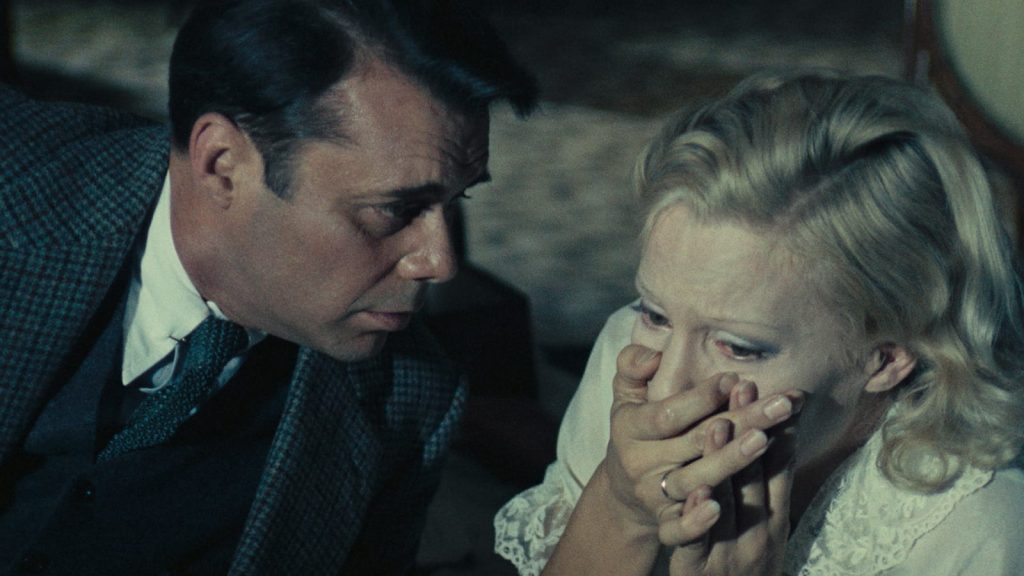
Video Quality
The Damned comes to Blu-Ray with a new digital AVC encoded 1080p transfer in 1.85:1 derived from a 2K restoration of the 35mm original camera negative. The presentation is as close to pristine as you could possibly wish for, as the new scan looks quite excellent throughout the entirety of the runtime. There were no discernible instances of print damage, and overall clarity and detail is magnificent. The picture holds up extremely well in long shots, and colors are well saturated in a visually splendid way. Skin tones are natural and consistent with subtle facial features easily noticeable in closeup. Black levels hold up well with virtually nothing in the way of crush and only some occasional loss of shadow detail. There does not appear to be any amount of digital noise due to compression limitations or other such nuisances. This new presentation is top-tier quality from beginning to end and should please any fan of the material.
Audio Quality
The Blu-Ray disc comes with a remastered LPCM 1.0 mono track in either English/German or Italian with optional English subtitles. Most of the performers supplied their real voices for the English track, and that appeared to be the most consistently natural of the two tracks. The score utilized within the feature sounds great throughout the duration of the film as it complements the inner lives of the characters. There are moments where it threatens to overwhelm the dialogue, but the track maintains a good balance so that dialogue comes through clearly. Environmental sounds such as machinery or background chatter are rendered well alongside everything else. There does not seem to be any majorly noticeable instances of age-related wear and tear. The Criterion Collection has given this film the well-preserved, faithful audio presentation it deserves.
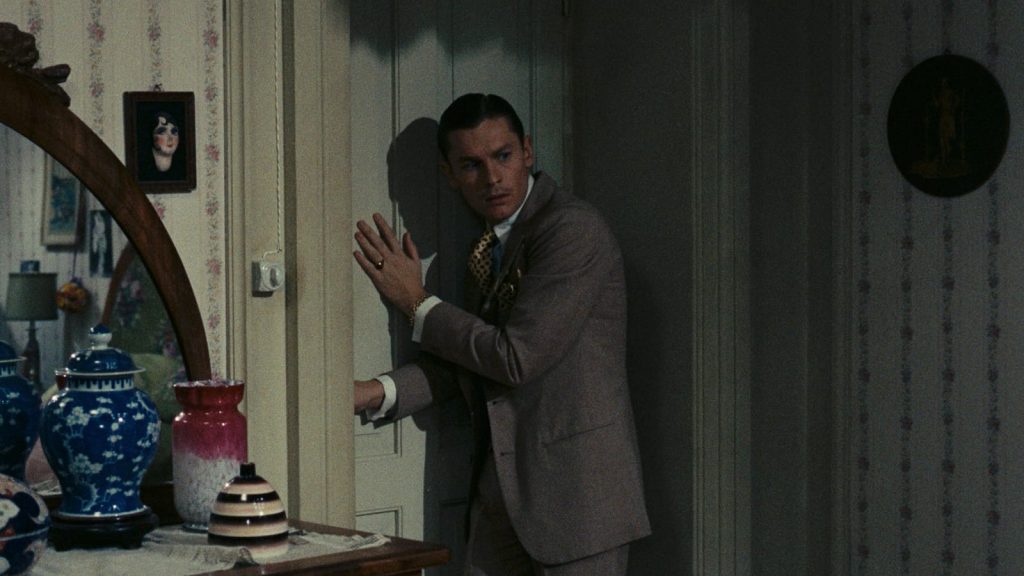
Special Features
The Criterion Blu-Ray of The Damned includes a foldout booklet featuring the new essay “Damned If You Do It” by film scholar D.A. Miller in which he discusses the themes and cultural relevance of the picture. This provides a great amount of context and insight into the film that is so worthwhile. The flip side of this foldout is a beautiful poster similar in style to the cover art, but a bit more evocative. The on-disc special features are as follows:
- Luchino Visconti: A 40-minute interview from 1970 for RAI television where Visconti along with journalist Giorgio Bocca discuss the film’s portrayal of Fascism, how it handles historical accuracy, the importance of setting this story in Germany instead of Italy, the influence of the time in which the film is created, the reception of the film and more. It is interesting to see some audience members really engage with Visconti and challenge him on ideas within the film in a constructive manner.
- Visconti On Set: A nine-minute behind-the-scenes documentary by John Abbott which features Visconti on the set of the film in which he talks about his process, finding the right performers for the film and more.
- Stefano Albertini: A new 16-minute interview with literature and film scholar Stefano Albertini in which he discusses the place of this film in Visconti’s career, the influence of Helmut Berger on the story, the unsparing nature of the work, the influence of Visconti’s family life, the perversions in the film, the importance of costumes and more.
- Ingrid Thulin: A ten-minute vintage interview with actor Ingrid Thulin for the French program Pour le cinema broadcast in 1969 in which she discusses her desire to transition to directing, what it is like working with Visconti, feeling safe shooting “sensitive” scenes with Ingmar Bergman and more.
- Charlotte Rampling: A four-minute vintage interview with actor Charlotte Rampling for the French program Musiques au coeur broadcast in 1990 in which she discusses what it is like working with Visconti, the powerful emotions she felt, her kinship with her director and more.
- Helmut Berger: A nearly six-minute vintage interview with actor Helmut Berger for the French program Le monde du cinema broadcast in 1969 in which he discusses working with Visconti to develop the character of Martin, his early work, how he met Visconti, the most difficult scene he shot and more.
- Trailer: The three-minute trailer is provided here.
Final Thoughts
The Damned is a very challenging film that is bound to alienate many viewers, but those who hang on to the artistic elements of the grotesque plot developments will be treated to something quite engaging. Luchino Visconti is once again unsparing in his artistic vision, which is something you have to admire in cinema. The performers do a really incredible job of bringing this material to the screen in an impactful manner. The Criterion Collection has released a Blu-Ray featuring a fantastic A/V presentation and a pleasing array of special features. If you are already accustomed to the peculiarities of Visconti, this one should be a safe buy. Recommended
The Damned is currently available to purchase on Blu-Ray and DVD.
Note: Images presented in this review are not reflective of the image quality of the Blu-Ray.
Disclaimer: The Criterion Collection has supplied a copy of this disc free of charge for review purposes. All opinions in this review are the honest reactions of the author.

Dillon is most comfortable sitting around in a theatre all day watching both big budget and independent movies.


